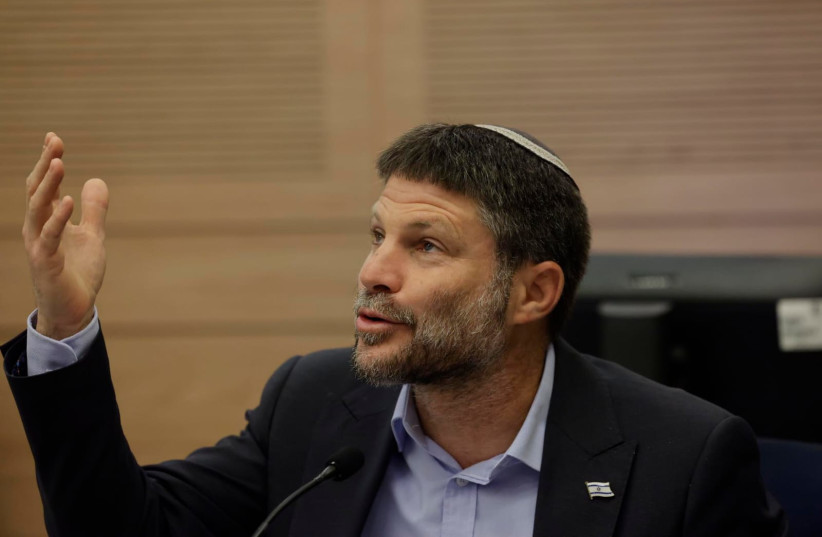Smotrich defends cutting funds for Arabs, vows to provide for them
“My policy is simple: services for the citizen – yes. Money for criminal organizations… and incitement to terrorism – no,” Finance Minister Bezalel Smotrich said to the press Wednesday evening after his ministry froze NIS 2.5 billion in funds to the Arab sector.
He stressed that he would only transfer the funds if it were clear it wasn’t being sent to crime syndicates or to incite terrorism.
“I am the finance minister for everyone,” he said, and “the Arab sector in Israel is an inseparable part of the state, and we are fully committed to providing for it.”
The finance minister said that every citizen is entitled “to proper services.”
He mentioned a new task force he set up at the Finance Ministery with the participation of the Tax Authority, the accountant general, and the Enforcement Authority, to fix the issues plaguing the sector.
 Israeli Finance Minister Bezalel Smotrich is seen at a meeting of the Knesset Foreign Affairs and Defense Committee, in Jerusalem, on July 19, 2023. (credit: MARC ISRAEL SELLEM/THE JERUSALEM POST)
Israeli Finance Minister Bezalel Smotrich is seen at a meeting of the Knesset Foreign Affairs and Defense Committee, in Jerusalem, on July 19, 2023. (credit: MARC ISRAEL SELLEM/THE JERUSALEM POST)Why did Smotrich cut funds to Israel’s Arab sector?
The cuts included hundreds of millions of shekels to promote education in east Jerusalem, as well as to build new schools and classrooms for underprepared municipalities. He has also received much pushback within his coalition, including from Interior Minister Moshe Arbel (Shas), Intelligence Minister Gila Gamiel (Likud), and Diaspora Affairs and Combatting Antisemitism Minister Amichai Chikli (Likud), as well as most of the opposition.
Arab leaders have also publicly denounced his decision, with mayors in Arab-majority municipalities warning that they may be unable to open schools next month.
Despite this, Smotrich stood firm, saying “We are not frightened by the attacks.”
He explained his decision to freeze the funds, backing up a statement he made to The Jerusalem Post earlier this week, “My decision to freeze a budget that originates from Mansour Abbas’s coalition promise.”
And that he aims to “condition it on the implementation of supervision and control mechanisms intended to ensure the money reaches the citizens and not the elements of crime and terrorism that harm Arabs first and foremost.”
Smotrich said that “the first victims are the Arab citizens of Israel who live in fear, are murdered, and lose the state’s budgets, which instead of improving the infrastructure and services they deserve flow to the criminal and terrorist organizations.”
Smotrich pushed back against his critics, saying that “this government has made the most significant contributions to Arab society,” and he has “been subjected to a cynical political and media campaign… they are devoid of facts [and are rife with] fake news, lies, and incitement.” He directly addressed some of the ministers, saying they were “wrong” in their letters to him.
Pointing to his work on behalf of the Arab public, he cited his work as transportation minister, investing heavily in road infrastructure and transportation in the Arab sector. Smotrich then said that he did that because he thought it was the right thing to do, and that this is how he also acts as finance minister.
He said that he hopes to improve the economic conditions of the Arab sector.
He mentioned a new task force he set up at the Finance Ministery with the participation of the Tax Authority, the accountant general, and the Enforcement Authority, to fix the issues plaguing the sector.
Smotrich addressed his claims that education increases nationalism, saying there is “Nationalist extremism that is, unfortunately, spreading in Arab society in Israel, including within the universities through radical Islamist cells that incite violence and terrorism, fighting IDF soldiers, and sympathizing with the enemy in times of war.”
Political activity groups who advocate for terrorist organizations are officially illegal in Israel, though it is unknown if they operate underground at universities.
He pointed to the impact that it has had not on the Jewish public, but the Arab public in the form of record killings in the Arab sector this year, with “more than 140 murdered since the beginning of the year.” The government has faced serious backlash for this fact, particularly as it has promised to crack down on crime across the country.
The Prime Minister’s Office released a statement while Smotrich was still speaking, writing that the funds will be transferred after it is made sure they end up where they’re supposed to.
“Prime Minister Netanyahu’s policy is to enable the development and well-being of all Israeli citizens, Arabs and Jews alike, and the evidence is that the governments led by Netanyahu have invested in the Arab citizens of Israel more than all Israeli governments combined.”
The statement included a direct quote from the prime minister, who reiterated that “The Arab citizens of Israel deserve what every citizen deserves and I am committed to that. This is my demand from all government ministries – and this will be done after we ensure that the funds will indeed reach their destination – for the Arab citizens of Israel.”





Comments are closed.